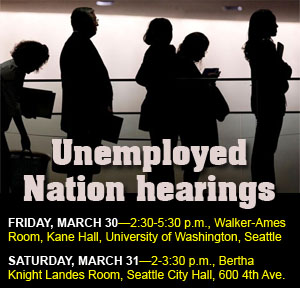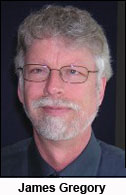OPINION
Listening to the ‘hidden nation’ of the unemployed
The Great Recession has been accompanied by a great silence. We read statistics about the unemployed but don’t see faces or hear voices of the jobless. This at a time when unemployment places a greater burden on families and on society than at any point since the Great Depression.
Why do we not learn their stories and see their faces in newspapers and on television? The unemployed have never been so hidden.
In the Great Depression, it took a while for unemployed workers to find their voices. People found it embarrassing and confusing to be out of work. Joblessness led to social hibernation then, as it does now.
But two to three years into the Depression the jobless were speaking out, forming organizations, seeking solutions. and demanding that politicians pay attention. In city after city, unemployed men and women became vocal and visible, reshaping elections and ultimately the American economy.
In West Seattle, a group of neighbors created a self-help club to exchange labor and services. Soon there was a city-wide network of clubs and an organization called the Unemployed Citizens League. By 1932, the UCL was a political force strong enough to turn elections.
 Today, the social dimensions of unemployment have changed dramatically. People file for unemployment benefits online or by phone. This is clearly helpful, but it means that the public display of joblessness that had captured the attention of journalists and photographers in the 1930s is missing.
Today, the social dimensions of unemployment have changed dramatically. People file for unemployment benefits online or by phone. This is clearly helpful, but it means that the public display of joblessness that had captured the attention of journalists and photographers in the 1930s is missing.
Jobless people are less likely to encounter each other, less likely to see that they are not alone and less likely to interact in ways that could lead to activism.
Moreover, news media are not reporting as extensively on this human tragedy. Shrinking newsrooms, shortened attention spans and our love of punditry encourage superficial reporting. It is easy to report statistics, easier still to let experts or ideologues argue about the economy. It takes a different effort to make public the personal stories of those suffering through the Great Recession.
And politicians are not helping. Why have there been so few Congressional hearings? Neither Democrats nor Republicans at either state or federal levels have been eager to hear from victims of the Great Recession.
The Occupy movement has given voice to the frustration over wealth disparity but has not focused closely on the plight of the unemployed. What might happen if today’s 23 million unemployed and underemployed should emerge from the shadows, find their voice, and take up the simple, urgent message: Give us jobs?
When this happened in the 1930s, the consequences were substantial. As the jobless became visible and vocal, they changed the psychology and politics of unemployment. By 1932, joblessness was not just a lonely personal problem, it was the nation’s problem. The unemployed in key cities were powerful enough to punish politicians who did not listen or care.
It’s time to end the silence. In a promising partnership, the University of Washington is joining with King County Labor Council, Mayor McGinn, and the Seattle City Council to stage two days of hearings March 30 and 31. The hearings will do what Congress has not: Listen to men and women who have lost livelihoods and so much more as a result of the Great Recession.
We will stage “hearings” because we all need to listen. News media report endless statistics, but mostly the 23 million remain anonymous and invisible.
We use the label “Unemployed Nation” because, even as unemployment rates slowly fall, there are 12.8 million unemployed and more than 10 million others either discouraged after prolonged searching or underemployed in involuntary part-time jobs — a total of 23 million people. A hidden nation.
If you go: Unemployed Nation Hearings; Friday, March 30, 2:30 – 5:30 p.m, Walker-Ames Room at UW’s Kane Hall and Saturday, March 31, 2:00 – 3:30 p.m, Seattle City Hall’s Bertha Knight Landes Room. Details at www.UnemployedNation.org.
James Gregory is a Professor of History and Harry Bridges Endowed Chair of Labor Studies at the University of Washington. He is also a spokesman for the upcoming Unemployed Nation Hearings. This column originally appeared at Crosscut, and it crossposted here with the author’s permission.






